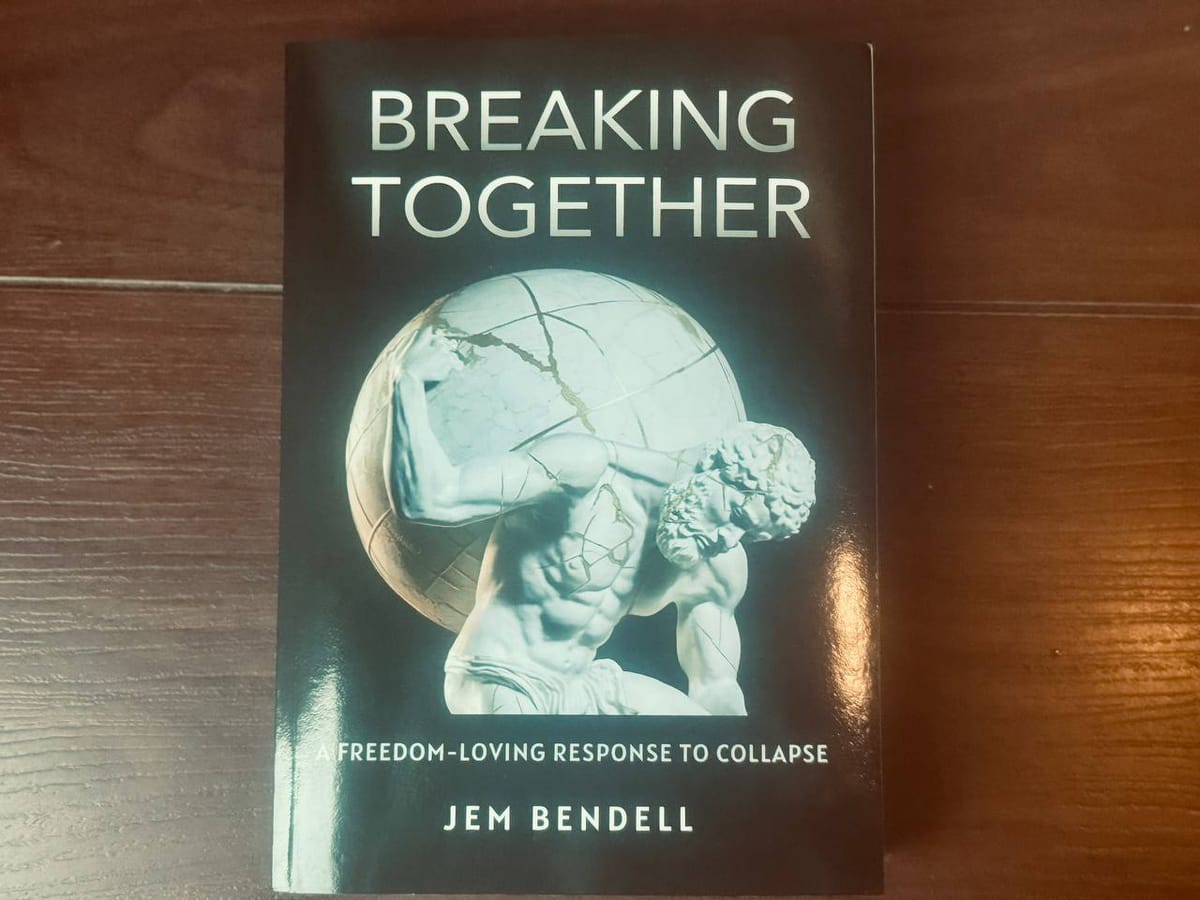Breaking Together: A Clear-Eyed Review, and Why I don't Expect a Great Turning
Adult eyesight on collapse: relinquish skim, restore basics, reconcile with limits. Fewer spectacles, more memory. Build small, sane enclaves and descend with dignity..

This is not cynicism. It's adult eyesight: primate loops in modern skins, running down the clock.
A sharp signal, before we begin
Open your power bill. Price drift. Open your news feed. More heat, more floods, more scapegoats. Grocery shelves thinner some weeks, services slower, tempers shorter. You don't need models to know which way the wind blows. Start there, then read the book.
What the book argues
Jem Bendell's Breaking Together asks us to stop performing hope and to live proportionately inside systemic descent. The three disciplines are plain:
- Relinquish: stop feeding skims that drain attention, money, and dignity
- Restore: rebuild food, energy, health, and knowledge at human scale
- Reconcile: make right with limits, people, and places
It's a call for steady capability over theatrical solutions. Read on its own terms, the book is honest and useful.
What this is not
- Not green growth or a clean-tech comeback story
- Not AI salvation or a techno-utopia pitch
- Not a viral-hope ritual to keep markets calm
This is not a positioning choice. I am writing for people who prefer proportion to performance.
Where I stand – and how this reads through my lens
I don't believe humans will deliver coordinated large-scale change in time. Not because we are evil, but because we are animals bound by ancient feedback loops: status hunger, in-group sorting, near-term bias, fear under scarcity. We dress the loops in new tech, but the behavior persists. I expect a long decline, not a sudden finale. That sets my scope: pockets of sanity, not planetary salvation.
Psychology and the old ape in the mirror
- Status and spectacle: Attention economies hijack our social wiring; outrage spreads faster than repair. Under stress, we default to signaling and scapegoats.
- Time preference: When buffers thin, shot-term wins beat long-term provisioning. Leaders perform confidence rituals; households chase relief.
- Group dynamics: We bond locally, polarize broadly, and punish defectors more than we reward stewards. Cooperation scales scales awkwardly beyond Dunbar ranges without strong myths or coercion.
This doesn't doom all action. it defines where action works: small groups, clear feedback, shared risk.
History without perfume
After Rome fell, literacy and farming knowledge survived in a few monasteries and stubborn villages. That is the shape I expect now: not global salvation, but enclaves of memory and competence.
Empire standardize, skim, and centralize; then they overextend, fragment, and localize. The archive after Rome, monasteries and villages, mountain enclaves after imperial retreat – knowledge and care survive in pockets that kept their scale honest. Bendell's frame rhymes with that record: design for descent, not for the comeback montage.
Tech and climate – why I don't expect rescue
- Tech amplifies intent; it rarely repairs incentives. Efficiency gains rebound into more use. Platforms optimize for engagement, not coherence. When systems wobble, technology can concentrate control faster than it distributes competence.
- Climate is a physics debt with interest. Feedbacks don't bargain. Adaptation is mandatory; mitigation is late and politically brittle. We will spend more cycles on coping than undoing.
Conclusion: use tech as a tool locally, distrust it as a savior globally. Provision basics, shorten supply lines, protect attention.
What I expect
- A long, uneven descent: reliability erodes, costs rise, politics harden, scapegoating cycles pulse.
- Islands of adequacy: households co-ops, parishes, and skill circles that keep people fed, warm, and oriented.
- Growing moral load at the edges: more decisions about who gets care, who gets let in. Reconciliation as practical ethics, not sentiment.
- Less spectacle, more memory: the work that matters is glamorous. Archives, gardens, neighbor ledgers, repair scripts.
This is not a prophecy. It's a prudent operating picture. We cannot know exactly how descent will unfold, only assume based on past and present patterns. Positive changes are possible. But I don't believe humanity, at scale, will deliver the transformations the world requires.
What the book still does for me
Even without belief in mass coordination, Bendell's three moves remain instruments:
- Relinquish becomes structural off-ramping: cancel prestige pursuits that force self-betrayal; design permission-light livelihoods.
- Restore becomes layered provisioning: Mode 1 –> Mode 2 – > Mode 3 for food, light, heat, water, and knowledge.
- Reconcile becomes infrastructure: conflict-repair protocols, standing exchanges, and boundaries that keep reciprocity alive.
Death and impermanence – the adult curriculum
Buddha's old lesson applies: we live and build under impermanence. Accepting death is not resignation; it's the end of magical thinking. When I stop pretending we are owed a global rescue, grief clears and action steadies. Small acts are not meaningless because they don't shift the arc. They reduce cruelty and preserve dignity on the way down. That is meaning enough.
Feeling tone: in the body it's quieter, heavier, but not numb – jaw unclenched, breath lower, a steadying in the belly that makes room for small, decent moves.
If you share my view, do this week
- Relinquish: one structural off-ramp that frees two hour and removes a permission bottleneck.
- Restore: one staple plus one off-the grid light added and tested; write the fallback steps on paper.
- Reconcile: make one specific repair, and set one standing exchange with a neighbor.
- Remember: archive one page you'd want a stranger to find when your lights are off.
Breaking Together is a clear manual for living through descent. I don't expect coordinated salvation. I expect the old primate loops to keep running. So I choose smaller plans, longer horizons, and failure that don't shatter. Accept death and impermanence. Reduce the skim. Feed reciprocity. Keep the archive.
Pick one off‑ramp and one repair this week. Tell someone nearby. Make it mutual. That’s how we descend with less cruelty and more truth.




Comments ()